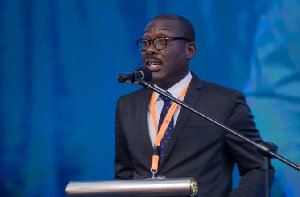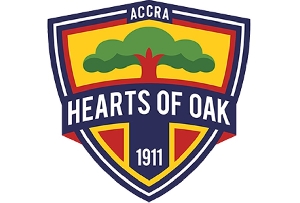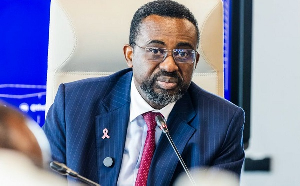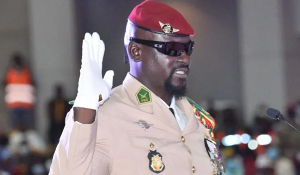By Kofi Ata, Cambridge, UK March 8, 2015
In the past weeks, Dr Osafo Marfo, a leading member of the main opposition party, NPP and a former Finance and Sports Minister in Ex-President Kufuor’s regime was alleged to have stated that Ghana’s resources are being managed by those from the three Northern Regions where there are few or no (natural) resources. In other words, those who should rule Ghana or be in-charge of Ghana’s resources should come from where the natural resources are found. Many, including me have condemned and accused him of racism and ethnocentrism. A demonstration was organised last week against the statement and numerous articles for and against have been written on the matter. This article is a contribution to the debate but from a different perspective. That is, did Dr Osafo Marfo use abominable language to raise an important constitutional matter?
Ghana has ten regions, including Northern, Upper East and Upper West. Article 4(1) of the 1992 Constitution states, “the sovereign State of Ghana is a unitary republic consisting of those territories comprised in the regions which immediately before the coming into force of this Constitution, existed in Ghana, including the territorial sea and the air space”. Nowhere in the 1992 Constitution does the appointment of Ghanaians as public officers should be based on the location of (natural) resources and I have not come across any executive arm of a democratically elected government on such basis.
The composition of the executive that Dr Osafo Marfo is alleged to have suggested would be near impossible to attain for various reasons. In the first place, how do we measure the natural resources in each region of Ghana? Again, which natural resources would be taken into consideration and what value would be placed on each natural resource, absolute or relative values? For example, how would the sea in Greater Accra region be valued against the sun in Upper West, particularly at a period of dumsor, when the sun is a vital resource for solar power? Last but not the least, would the value be per capita or just raw values?
Another debatable question raised by the suggestion whether one believes in creation or evolution is, why should those in some parts of Ghana unfortunate to be endowed with less natural resources freely left there by the creator or the result of evolutionary processes be punished by being denied the right to manage the nation’s resources? I guess the “Osafo Marfo Executive Formula” would be based on existing, known and already discovered natural resources. If my guess is right, what should happen if all of in the future a huge and highly valuable new natural resource were to be discovered in Ghana that surpasses the value of all existing, known or already discovered natural resources? Would the Executive have to be reconstituted and what should be done if for example, all the gold, diamond, oil, cocoa, timber and other natural resources in the south, etc were depleted?
No matter how one would want to defend Dr Osafo Marfo, what he is alleged to have said is indefensible. It is therefore understandable the criticisms and condemnations heaped on him. In fact, his alleged statement was unconstitutional because it conflicts with the Directive Principles of State Policy in Chapter Six, Article 35(5) of the 1992 Constitution and I quote, “The State shall actively promote the integration of the peoples of Ghana and prohibit discrimination and prejudice on the grounds of place of origin, circumstances of birth, ethnic origin, gender or religion, creed or other beliefs”.
Notwithstanding the above and after a critical analysis of what Dr Osafo Marfo is alleged to have said, I have come to the conclusion that Dr Osafo Marfo raised a very important constitutional matter but through very unacceptable language. Dr Osafo Marfo is absolutely right to question the composition of the Executive and those who occupy senior positions in public office in Ghana. The questions he should have posed were the regional balance and quality of those in the Executive, including public office holders and not where the natural resources of the state are found. That is immaterial and outlawed in Article 35(5) above, though Chiefs from Western region demanded and got the Minister for Energy appointed from the region because the oil is in that region.
Article 35(6) of the Constitution states, “towards the achievement of the objectives stated in clause (5) of this article, the State shall take appropriate measures to - (b) achieve reasonable regional and gender balance in recruitment and appointment to public offices”. I believe Dr Osafo Marfo wanted to ask if the recruitment and appointment of public offices in Ghana has a regional and gender balance. Sadly and unfortunately, he did not only do the wrong analysis but also unpardonably, his choice or words were tantamount to ethnocentric or racist language.
From Articles 35(5) it is not in doubt that any Ghanaian irrespective of where s/he was born or from whether there are natural resources or not, of sound mind, qualified to be elected as President or Vice, MP, be appointed into the Cabinet/Executive and public office to manage the resources of the country. At the same time, under Article 35(6)(b), Ghanaians, including Dr Osafo Marfo have the right to question and demand regional and gender balance in those who hold public offices, including the Executive.
Dr Osafo Marfo is a well educated senior politician and ought to have been aware of both Articles 35(5) and 35(6)(b). He should have been guided by the latter clause and be bold to question whether there are too many public office holders from the three Northern Regions and if that is the case, then it’s a breach of Article 35(6)(b). But as coward that he is, and perhaps of some wrong perception that only people from certain parts of Ghana should rule, he decided to take ethnocentric view on the subject. In so doing, he messed up what should have been a very important and legitimate constitutional question.
It is no good denying that there is a general perception in Ghana that, President Mahama’s appointment of public officers does not reflect a regional and gender balance as required under the 1992 Constitution (a potential source of tension and resentment). To be precise, the charge is that President Mahama has appointed too many from the three Northern Regions and men into public offices contrary to the Constitution. Dr Osafo should have been bold to say so and that would not have ethnocentrism or racism but a constitutional matter. I have not taken a count of the public office holder appointments made by President Mahama’s and their region of origin and sex to conclusively say that the perception is accurate or not. The President should be in a better position to prove the doubters wrong as he must be guided by the Constitution in appointing public officers.
Please do not tell me that the same happened under Ex-Presidents Rawlings and Kufour so what is the big deal under President Mahama? What is wrong is wrong and the fact that the two ex-Presidents breached the Constitution does not make it right for President Mahama to continue to act unconstitutionally.
I am also aware that the recruitment of some public office holders are carried out by the Public Services Commission so some people may excuse the President from blame and accountable if there are over-representation from the three regions. I disagree because the final appointment rests with the President as the Public Services Commission recommends successful candidates to the President and the President has veto powers to reject any recommended candidate in consultation with the Council of State. The President can therefore rely on the Constitutional requirement of regional and gender balance not to appoint recommended candidates.
The only difficult with Article 35(6)(b) is that, what is meant by regional and gender balance are not defined. Should regional balance be based on respective total population of the regions, the proportion of voting age, registered voters or number of MPs represented in Parliament? Again, with gender balance, should it be the proportion of women in the total population or those of voting age or registered voters? If it’s the proportion of the total population, considering the number of women in active politics, is such gender balance realistic and achievable? I think the Supreme Court must give some directions on Clause (6)(b) of Article 35.
Another important question that Dr Osafo Marfo should have raised is the quality of those appointed into public office rather than where resources are. That is, are some of those appointed into public office effective and efficient? From the mismanagement and corruption at GYEEDA and SADA, some of President Mahama’s public office appointees from the three Northern regions have not only disappointed him but have also failed the people of the three regions. I should point out that they failed not because they are from the three regions but because they did not have requisite experience and skills for the positions. They were corrupt not because they are from the three regions but because they are Ghanaians first and foremost.
Finally, it ought to be pointed out that the President has the prerogative right to select and appoint people into public office, including his cabinet and the Executive that he can trust and work with but that must be within the requirement of a regional and gender balance and qualifications or suitability. If the President trusts people from certain parts of the country and wants to work with to deliver his vision, then, as far as he fulfils the constitutional requirement of regional and gender balance and they are delivering, who cares, if there are no natural resources in where they come from?
In any case, who told Dr Osafo Marfo that there are few or no natural resources in the three Northern Regions? If it rains only in the south would Akosombo Dam not dry up whilst if it rains in the north it will secure the viability of Akosombo Dam? Is that not vital natural resource from the Northern Regions? What about the fertile land for food production in the three regions, the land which is good for shea butter, cotton cultivation, the sun for harvesting solar energy, etc? If one believes in creation, then, are the population from the three regions not natural resource of high quality since some of the most educated and highly qualified Ghanaians are from the three Northern Regions?
The idea of an Executive Formula, including public office holders based on the availability of natural resource or lack of it in a particular part of Ghana is an anathema, irrational and a recipe for ethnic conflict and disunity. For example, in the UK, when the Conservative Party is in power, despite North Sea Oil from Scotland, there are very few Cabinet Ministers and public office holders of Scotland origin. On the other hand, when Labour is power, lots of the Cabinet and public office holders are Scottish, not because of the North Sea Oil but simply because the Labour Party leadership has a good number from Scotland.
Dr Osafo Marfo’s statement is not only irrational but smells of elitism. People should be appointed to public office based on their ability to do the job bearing in mind the constitutional requirement of regional and gender balance and not any elitist and ethnocentric criteria shrouded in some natural resource based formula.
Kofi Ata, Cambridge, UK
Opinions of Wednesday, 11 March 2015
Columnist: Ata, Kofi














